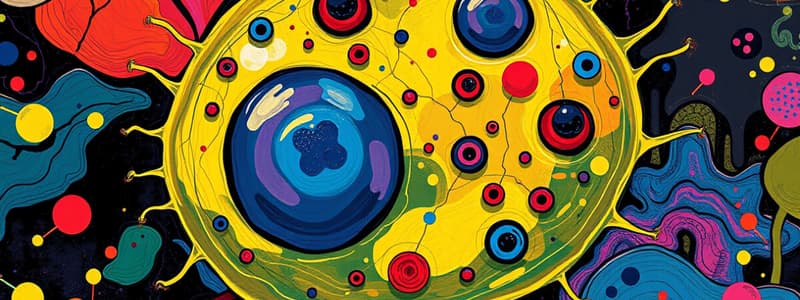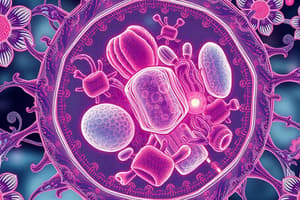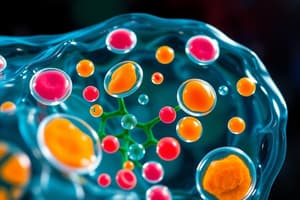Podcast
Questions and Answers
Which statement accurately reflects the cell theory?
Which statement accurately reflects the cell theory?
- Cells arise spontaneously.
- All cells are identical in structure.
- All living organisms are composed of cells. (correct)
- Cells cannot divide or reproduce.
What distinguishes prokaryotic cells from eukaryotic cells?
What distinguishes prokaryotic cells from eukaryotic cells?
- Prokaryotic cells have a nucleus.
- Eukaryotic cells are unicellular organisms.
- Prokaryotic cells are larger and more complex.
- Eukaryotic cells contain membrane-bound organelles. (correct)
What is the primary function of mitochondria in a cell?
What is the primary function of mitochondria in a cell?
- Synthesis of lipids.
- Energy production through cellular respiration. (correct)
- Storage of genetic material.
- Site of protein modification.
During which phase of cell division does meiosis produce genetic diversity?
During which phase of cell division does meiosis produce genetic diversity?
Which of the following best describes passive transport across a cell membrane?
Which of the following best describes passive transport across a cell membrane?
Which process involves the copying of DNA into mRNA?
Which process involves the copying of DNA into mRNA?
Gregor Mendel's law of segregation states that:
Gregor Mendel's law of segregation states that:
Which type of mutation is characterized by an insertion of one or more nucleotides?
Which type of mutation is characterized by an insertion of one or more nucleotides?
What is the result of mitosis in somatic cells?
What is the result of mitosis in somatic cells?
Which organelle is primarily responsible for protein synthesis?
Which organelle is primarily responsible for protein synthesis?
Flashcards are hidden until you start studying
Study Notes
Cell Biology
-
Cell Theory
- All living organisms are composed of cells.
- The cell is the basic unit of life.
- All cells arise from pre-existing cells.
-
Prokaryotic vs Eukaryotic Cells
- Prokaryotic: No nucleus, smaller, simpler (e.g., bacteria).
- Eukaryotic: Nucleus present, larger, complex (e.g., plant and animal cells).
-
Cell Organelles
- Nucleus: Contains genetic material, controls cell activities.
- Mitochondria: Site of cellular respiration, energy production.
- Ribosomes: Protein synthesis.
- Endoplasmic Reticulum (ER):
- Rough ER: Studded with ribosomes, synthesizes proteins.
- Smooth ER: Lipid synthesis and detoxification.
- Golgi Apparatus: Modifies, sorts, and packages proteins and lipids.
- Lysosomes: Digestion of macromolecules, waste disposal.
- Cell Membrane: Semi-permeable barrier, regulates entry and exit of substances.
-
Cell Division
- Mitosis: Division of somatic cells, results in two identical daughter cells.
- Meiosis: Division that produces gametes, results in four genetically diverse cells.
-
Transport Mechanisms
- Passive Transport: Movement of substances across membranes without energy (e.g., diffusion, osmosis).
- Active Transport: Movement against concentration gradient, requires energy (e.g., pump proteins).
Genetics
-
Mendelian Genetics
- Gregor Mendel's laws:
- Law of Segregation: Alleles segregate during gamete formation.
- Law of Independent Assortment: Genes assort independently during gamete formation.
- Dominant and recessive traits.
- Gregor Mendel's laws:
-
DNA Structure and Function
- DNA: Double helix structure composed of nucleotides (adenine, thymine, cytosine, guanine).
- Chromosomes: Structures made of DNA and proteins, carry genetic information.
-
Gene Expression
- Transcription: Process of copying DNA into mRNA.
- Translation: Process of synthesizing proteins from mRNA at ribosomes.
-
Mutations
- Types: Point mutations, insertions, deletions.
- Effects: Can be silent, missense, or nonsense.
-
Genetic Technologies
- PCR (Polymerase Chain Reaction): Amplification of DNA sequences.
- Gel Electrophoresis: Separation of DNA fragments by size.
- CRISPR: Gene editing technology that allows for precise modifications to DNA.
-
Inheritance Patterns
- Autosomal dominant and recessive disorders.
- Sex-linked traits, pedigree analysis.
- Polygenic inheritance: Traits controlled by multiple genes.
Cell Biology
- Cell Theory states that all living organisms are made of cells, which are the fundamental units of life, and that cells arise only from pre-existing cells.
- Prokaryotic Cells lack a nucleus, are generally smaller and simpler in structure, exemplified by bacteria.
- Eukaryotic Cells possess a nucleus, are larger and more complex, represented by plant and animal cells.
- Nucleus functions as the control center, housing genetic material (DNA) and regulating cell activities.
- Mitochondria serve as the powerhouse of the cell, responsible for cellular respiration and energy production.
- Ribosomes are the sites of protein synthesis, essential for cell function and growth.
- Endoplasmic Reticulum (ER) includes:
- Rough ER: Studded with ribosomes; involved in synthesizing proteins.
- Smooth ER: Engaged in lipid synthesis and detoxification processes.
- Golgi Apparatus modifies, sorts, and packages proteins and lipids for secretion or use within the cell.
- Lysosomes contain digestive enzymes for breaking down macromolecules and waste disposal.
- Cell Membrane is a semi-permeable barrier that controls the movement of substances in and out of the cell.
- Mitosis results in two genetically identical daughter cells, crucial for growth and repair of tissues.
- Meiosis produces gametes, leading to four genetically diverse cells, essential for sexual reproduction.
- Passive Transport allows substances to move across membranes without energy, including processes like diffusion and osmosis.
- Active Transport requires energy to move substances against a concentration gradient, often involving pump proteins.
Genetics
- Mendelian Genetics is based on Gregor Mendel's principles:
- Law of Segregation states that alleles separate during gamete formation.
- Law of Independent Assortment indicates that genes are inherited independently of one another.
- DNA features a double helix structure made of nucleotides: adenine, thymine, cytosine, and guanine.
- Chromosomes are made of DNA and proteins, serving as carriers of genetic information.
- Transcription is the process that converts DNA into mRNA, a critical step in gene expression.
- Translation synthesizes proteins from mRNA at ribosomes, following transcription.
- Mutations can occur in various forms, including:
- Point mutations, insertions, and deletions.
- Their effects may be silent, missense (leading to an amino acid change), or nonsense (resulting in early termination of translation).
- Genetic Technologies include:
- PCR (Polymerase Chain Reaction): Used for amplifying specific DNA sequences.
- Gel Electrophoresis: Separates DNA fragments by size for analysis.
- CRISPR: Gene editing technology that enables precise modifications to DNA sequences.
- Inheritance Patterns encompass:
- Autosomal dominant and recessive disorders affecting trait transmission.
- Sex-linked traits and the use of pedigree analysis for understanding genetic heritage.
- Polygenic inheritance refers to traits influenced by multiple genes, showcasing complex genetic interactions.
Studying That Suits You
Use AI to generate personalized quizzes and flashcards to suit your learning preferences.




